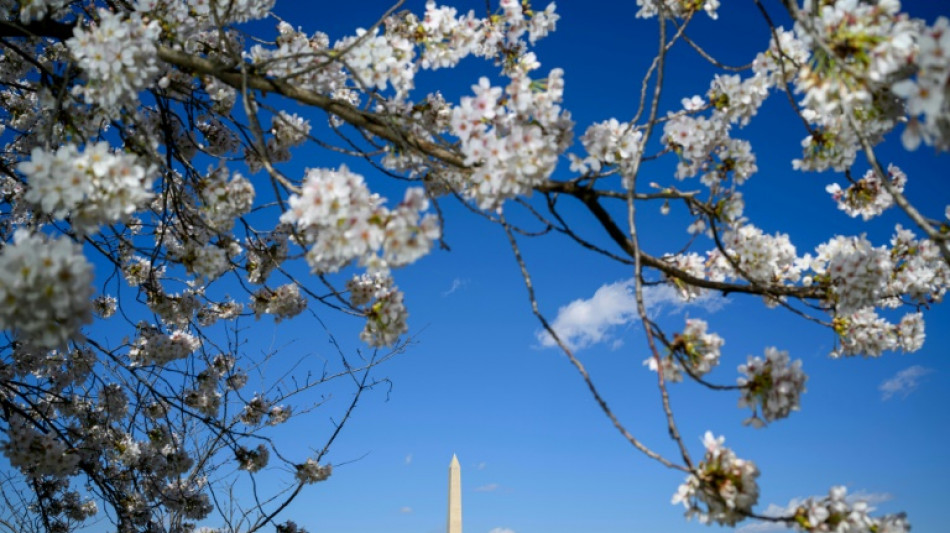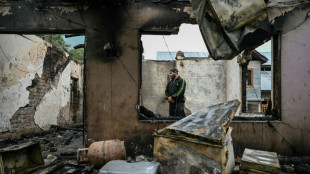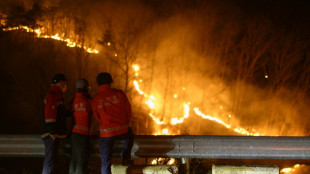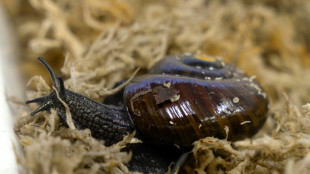
-
 Weary border residents in Indian Kashmir struggle to survive
Weary border residents in Indian Kashmir struggle to survive
-
Leo XIV says Church must fight 'lack of faith' in first mass as pope

-
 Liverpool boss Slot fears replacing Alexander-Arnold will be a tough task
Liverpool boss Slot fears replacing Alexander-Arnold will be a tough task
-
British Airways owner unveils big Boeing, Airbus order

-
 IPL suspended for one week over India-Pakistan conflict
IPL suspended for one week over India-Pakistan conflict
-
Slot says all at Liverpool sad to see Alexander-Arnold go

-
 Leo XIV celebrates first mass as pope in Sistine Chapel
Leo XIV celebrates first mass as pope in Sistine Chapel
-
India says repulsed fresh Pakistan attacks as death toll climbs

-
 Japan's Panasonic targets 10,000 job cuts worldwide
Japan's Panasonic targets 10,000 job cuts worldwide
-
Putin evokes WWII victory to rally Russia behind Ukraine offensive

-
 China exports beat forecasts ahead of US tariff talks
China exports beat forecasts ahead of US tariff talks
-
Leo XIV, the 'Latin Yankee', to celebrate first mass as pope

-
 Most stocks lifted by hopes for US-China talks after UK deal
Most stocks lifted by hopes for US-China talks after UK deal
-
IPL suspended indefinitely over India-Pakistan conflict: reports

-
 German lender Commerzbank's profits jump as it fends off UniCredit
German lender Commerzbank's profits jump as it fends off UniCredit
-
Rare bone-eroding disease ruining lives in Kenya's poorest county

-
 India says repulsed fresh Pakistan attacks as de-escalation efforts grow
India says repulsed fresh Pakistan attacks as de-escalation efforts grow
-
Zhao's historic snooker title sparks talk of China world domination

-
 'High expectations': EU looks to Merz for boost in tough times
'High expectations': EU looks to Merz for boost in tough times
-
Poisoned guests rarely invited before deadly mushroom lunch, Australia trial hears

-
 China sales to US slump even as exports beat forecasts
China sales to US slump even as exports beat forecasts
-
Indian cricket to make 'final decision' on IPL over Pakistan conflict

-
 Dethroned Bundesliga champions Leverkusen face uncertain future
Dethroned Bundesliga champions Leverkusen face uncertain future
-
China can play hardball at looming trade talks with US: analysts

-
 French monuments in trouble while PSG prepare for Champions League final
French monuments in trouble while PSG prepare for Champions League final
-
Newcastle face Chelsea in top five showdown, Alexander-Arnold in spotlight

-
 Flick's Barca must show 'hunger' in crunch Liga Clasico
Flick's Barca must show 'hunger' in crunch Liga Clasico
-
Clasico the last chance saloon for Ancelotti's Real Madrid

-
 Timberwolves overpower Warriors to level series
Timberwolves overpower Warriors to level series
-
Chinese fabric exporters anxious for US trade patch-up

-
 Putin gears up to host world leaders at lavish army parade
Putin gears up to host world leaders at lavish army parade
-
Nearing 100, Malaysian ex-PM Mahathir blasts 'old world' Trump

-
 Leo XIV, first US pope, to celebrate first mass as pontiff
Leo XIV, first US pope, to celebrate first mass as pontiff
-
Asian stocks lifted by hopes for US-China talks after UK deal

-
 Former head of crypto platform Celsius sentenced 12 years
Former head of crypto platform Celsius sentenced 12 years
-
Ex-model testifies in NY court that Weinstein assaulted her at 16

-
 Strawberry Fields REIT Announces First Quarter 2025 Operating Results
Strawberry Fields REIT Announces First Quarter 2025 Operating Results
-
Amphastar Pharmaceuticals to Present at the 2025 Bank of America Health Care Conference

-
 Ascendant Resources Announces Closing of Second and Final Tranche of Non-Brokered Private Placement
Ascendant Resources Announces Closing of Second and Final Tranche of Non-Brokered Private Placement
-
Nestlé and OMP Showcase Approach to Future-Ready Supply Chain at Gartner Supply Chain Symposium/Xpo in Barcelona

-
 Genflow Biosciences PLC Announces Share Subscription, Director's Dealing and Update
Genflow Biosciences PLC Announces Share Subscription, Director's Dealing and Update
-
Argo Blockchain PLC Announces 2024 Annual Results and Restoration of Listing

-
 'Great honor': world leaders welcome first US pope
'Great honor': world leaders welcome first US pope
-
Pacquiao to un-retire and fight Barrios for welterweight title: report

-
 Trump unveils UK trade deal, first since tariff blitz
Trump unveils UK trade deal, first since tariff blitz
-
Man Utd one step away from Europa League glory despite horror season

-
 Jeeno shines on greens to grab LPGA lead at Liberty National
Jeeno shines on greens to grab LPGA lead at Liberty National
-
Mitchell fires PGA career-low 61 to grab Truist lead

-
 AI tool uses selfies to predict biological age and cancer survival
AI tool uses selfies to predict biological age and cancer survival
-
Extremely online new pope unafraid to talk politics


Climate change hits Washington's beloved cherry blossom festival
It is one of the prettier fixtures of spring in Washington: thousands of cherry trees bloom amid the city's stately monuments in a spectacle that draws more than a million visitors every year.
But because of climate change, those eager to enjoy the clouds of pale pink petals and their almond-like scent have to get here earlier than they used to.
Warmer weather means the peak of this gigantic bloom starts around mid-March, on average six days earlier than a century ago.
This year, after the United States had its warmest winter on record, the cherry blossom pinnacle came on March 17. Only once before, in 1990, did the peak happen earlier.
"It is a real-world example of how climate change is affecting the nation's capital," said Mike Litterst, head of communications for the National Mall and Memorial Parks.
Another result of this greater warmth is that cherry trees lining the Tidal Basin -- a reservoir connected to the nearby Potomac River that is one of several spots where people can see the bloom -- are sometimes under several inches of water at their base because the inlet has overflowed.
This is due in part to higher sea levels, which also affect the flow in the Potomac.
The park service plans later this year to carry out major construction work to build up and improve an old, ineffective seawall meant to hold back the water, which will cause a disruption to the next two cherry blossom festivals.
Some 300 trees around the Tidal Basin, including 158 cherry trees, will be chopped down, to the dismay of some Washingtonians.
This decision was not taken lightly, said Litterst, adding that 455 trees, including 270 cherry trees, will eventually be planted once the seawall work is completed.
"Leaving things as they are is not an option because the end result of that eventually is no cherry trees" in this area, he told AFP.
- Serious consequences -
In 1912, the mayor of Tokyo gave the city of Washington roughly 3,000 cherry trees, as a gift of friendship. The National Mall, the vast green esplanade area in downtown Washington, now features around 3,700 of them.
They comprise about a dozen kinds of cherry trees, and along the Tidal Basin most are of a variety called Yoshino, with pale pink blossoms that people love to take selfies with.
This year the bloom cycle was also shorter than ever: it only took 15 days from when the first cherry buds appeared until the full bloom -- compared to the previous average of 26.
Last week temperatures in Washington surpassed 70 degrees Fahrenheit (20 degrees C) five days in a row, with winter not yet officially over.
This earlier and earlier peak of the bloom affects not just visitors' travel plans but could also have serious consequences for pollinating insects, said Litterst.
"What happens if we get to a point where we are reaching blossoms so early, that none of those pollinators are out," he mused.
- Goodbye to 'Stumpy' -
But Litterst said what most strikes him in his 10th cherry blossom season is the rising water levels from the Tidal Basin.
Ten years ago, say, some spots along the inlet would flood once a month at high tide but now they are covered with water every week or even every day, he said.
"It's been fascinating, if not a little bit scary to watch the effects of the water especially," he said.
"The water comes over the seawall here twice a day, every day during high tide. It's not a question of is it going to come over the wall? The question is how far inland is the water going to go?"
The current seawall was poorly constructed more than 100 years ago and has settled in some spots by five feet (1.5 meters) or so while water levels in the basin have gone up one foot(30 centimeters).
The work to build up the seawall will take three years and cost around $113 million. And crews will be able to add to the new structure and raise it if necessary to deal with even more water, Litterst said.
"I think it's so sad and hard, seeing how much climate change is really impacting us with this early bloom and with the ways that we can see the sea starting to take bites out of the city," said Caitlin Cotter Coillberg, a minister in suburban Washington.
"So I'm looking forward to seeing it again once they've repaired it," she added.
Besides the construction plans, and how they will disrupt the next two festivals, Washingtonians are also sad that one of the trees due to be cut down is Stumpy -- a short and oddly shaped ugly duckling star of the annual cherry blossom celebrations.
The other trees due to be felled will be turned into mulch -- but with Stumpy, cuttings will be taken to create new trees with its same DNA, if not the same unfortunate silhouette.
D.Sawyer--AMWN



